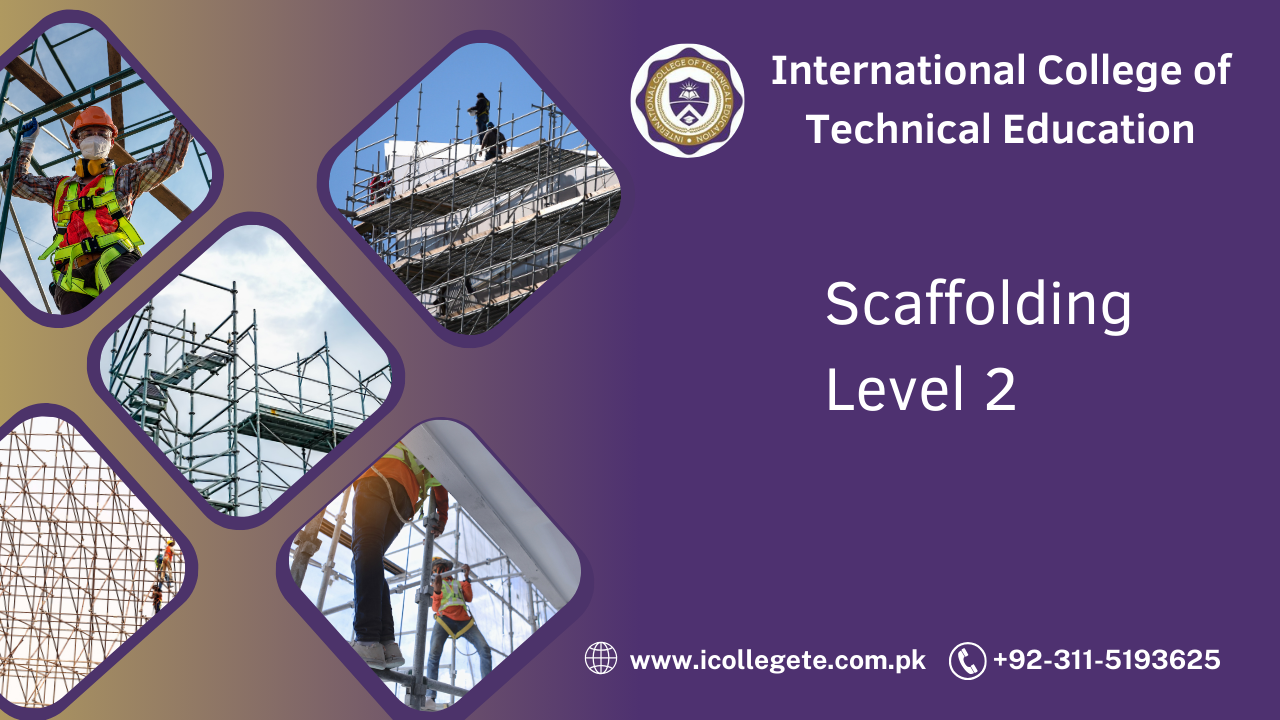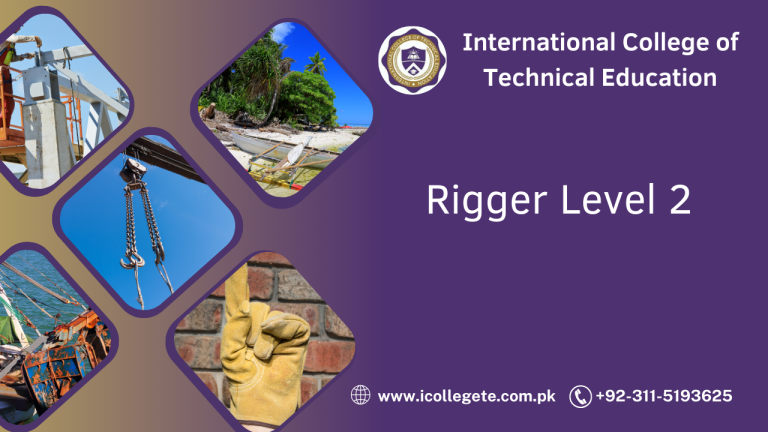The construction industry is one of the most dynamic sectors globally, and scaffolding remains a crucial component for ensuring safety and stability at construction sites. As a scaffolder, advancing your skills and certifications is essential to progress in your career. The Scaffold Level 2 Course in Islamabad is the next step for those who have completed the Level 1 certification and are looking to enhance their knowledge and expertise in scaffolding. This course not only builds on the fundamentals but also delves into more advanced techniques and responsibilities that will help you excel in the field.
The Scaffold Level 2 Course in Islamabad is designed for individuals who have already gained a basic understanding of scaffolding principles and are ready to take their skills to the next level. This intermediate course provides comprehensive training in scaffolding assembly, design, and management, as well as advanced safety and regulatory knowledge. Successful completion of this course equips students with the competencies needed to handle more complex scaffolding projects and prepare for supervisory roles in the construction industry.
Course Overview
The Scaffold Level 2 Course expands upon the skills learned in Level 1, preparing participants for more advanced responsibilities. This course is ideal for those aiming to become scaffold supervisors or those who want to improve their practical and theoretical knowledge of scaffolding. It includes training on scaffold design, complex assembly and dismantling techniques, and managing scaffolding teams on-site.
Key Areas Covered:
- Scaffolding Systems and Designs
Learn to design and customize scaffolding systems for various construction projects, including high-rise buildings, bridges, and industrial sites. - Advanced Scaffolding Techniques
This unit covers complex scaffold erection and dismantling processes, focusing on large-scale projects and the use of advanced equipment. - Scaffold Inspections and Safety Management
Understand how to inspect scaffolding structures, identify potential hazards, and ensure safety compliance on-site. You’ll also be trained on how to conduct safety briefings and risk assessments. - Scaffolding for Special Purposes
Learn about specialized scaffolding used in different construction scenarios, such as suspended scaffolds, cantilever scaffolds, and scaffolds for confined spaces. - Team Coordination and Leadership
This unit focuses on managing scaffolding teams, delegating tasks, and ensuring that all work is done safely, efficiently, and in line with project timelines.
The course will be a combination of theoretical lessons and practical, hands-on training to ensure students can apply what they learn to real-world situations.
Study Units
- Designing Scaffolding Systems
Students will learn how to design scaffolds based on project requirements, including load calculations and choosing the correct components. This unit will also focus on safety considerations during scaffold design. - Complex Scaffold Assembly and Dismantling
This module covers the assembly and dismantling of complex scaffolding structures, such as large multi-tiered scaffolds or scaffolding for industrial applications. - Scaffold Inspections and Quality Control
Students will learn how to carry out thorough scaffold inspections, ensuring all systems comply with safety standards and regulations. - Safety Regulations and Risk Management
Advanced safety techniques are discussed, focusing on risk assessments, hazard identification, and implementing the best practices for scaffolding safety. - Leadership and Team Management
This unit is designed to help students develop their leadership and team management skills, preparing them for future supervisory roles in scaffolding.
Learning Outcomes
By the end of the Scaffold Level 2 Course, participants will be able to:
- Design scaffolding systems suitable for a variety of construction projects, including large and complex structures.
- Safely erect, modify, and dismantle scaffolds according to the latest standards.
- Conduct detailed scaffold inspections and carry out risk assessments to ensure safety compliance.
- Lead and manage scaffolding teams, ensuring tasks are completed efficiently and safely.
- Demonstrate in-depth knowledge of safety regulations and best practices in scaffolding.
- Apply advanced scaffolding techniques in real-world construction environments.
Course Benefits
- Higher-Level Certification: Completing the Scaffold Level 2 Course boosts your qualifications, positioning you as a more advanced and capable scaffolder. This opens doors to higher-paying roles and more complex projects.
- Advanced Practical Skills: The course offers hands-on training with advanced scaffolding techniques, allowing you to handle a wide range of scaffolding challenges with confidence.
- Supervisory Opportunities: With a Level 2 certification, you will be eligible for leadership roles, such as scaffold supervisor, where you will oversee scaffolding teams and ensure safety standards are met on large-scale projects.
- Improved Safety and Risk Management Skills: The course emphasizes safety, helping you become proficient in identifying and mitigating risks on-site. This is a crucial skill in today’s construction industry.
- Career Advancement: Completing this course provides you with the tools to advance your career within the construction industry. You will be well-positioned for more senior roles, including site management and safety management.
Who is This Course For?
The Scaffold Level 2 Course in Islamabad is ideal for:
- Level 1 Scaffolders: If you have already completed the Scaffold Level 1 course and want to further your skills, this course is the natural next step.
- Experienced Scaffolders: For those with some scaffolding experience but lacking formal certification, Level 2 provides advanced skills and knowledge for more complex scaffolding tasks.
- Site Supervisors and Managers: If you aspire to take on supervisory or managerial roles in construction projects, this course will give you the necessary expertise in managing scaffolding teams and ensuring safety compliance.
- Construction Workers Looking to Specialize: Workers in the construction industry who are looking to specialize in scaffolding and take on more responsibility in scaffold design and safety management will benefit from this course.
Future Progression for This Course
Completing the Scaffold Level 2 Course opens many doors for career progression, including the possibility of moving on to higher certifications and more senior roles. After Level 2, you can progress to:
- Scaffold Level 3: This is an advanced course focused on scaffold supervision and management, where you will learn how to manage large scaffolding projects and teams. A Level 3 certification is ideal for those aiming to become scaffold supervisors or managers.
- Scaffold Supervisor and Manager Courses: For those who wish to take on leadership roles, there are specialized courses focused on site management, team leadership, and compliance monitoring.
- Health and Safety Qualifications: After completing Level 2, individuals often go on to study health and safety qualifications, which are essential for taking on higher roles in the construction industry.
- Independent Contractor or Business Owner: With the skills and qualifications gained from the Level 2 course, scaffolders can pursue self-employment opportunities, offering scaffolding services to construction companies and contractors.
The Scaffold Level 2 Course in Islamabad is an invaluable stepping stone for those looking to advance in the scaffolding industry. With its focus on advanced techniques, safety management, and leadership skills, this course prepares students to take on more complex and higher-responsibility roles in construction projects. Whether you are looking to become a scaffold supervisor, gain specialized knowledge in scaffolding systems, or advance in your construction career, this course offers the training you need to succeed. Completion of the Scaffold Level 2 Course will give you the skills, confidence, and qualifications to excel in one of the most rewarding sectors of the construction industry.







